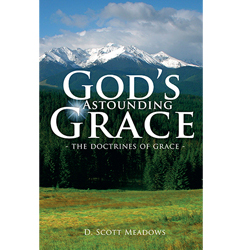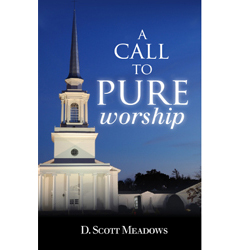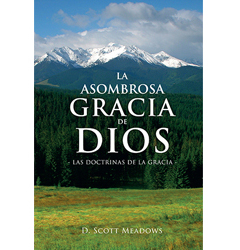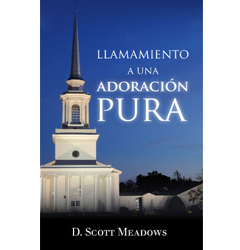

Led by the Lord
D. Scott Meadows
“As many as are led by the Spirit of God, they are the sons of God” (Rom 8.14). “In this the children of God are manifest, and the children of the devil: whosoever doeth not righteousness is not of God, neither he that loveth not his brother” (1 Jn 3.10). Being led by the Lord in the way of righteousness is a distinguishing mark of true Christians, and such are exhorted to greater trust and more consistent obedience to the Lord who leads them. The same doctrine shines from both Testaments of Holy Scripture. Proverbs 3.5, 6 is a familiar favorite passage of many people.
5 Trust in the LORD with all thine heart;
And lean not unto thine own understanding.
6 In all thy ways acknowledge him,
And he shall direct thy paths.
These beautiful words link a Christian’s trusting heart with a godly life. Faith works. Great faith works greatly. In a true conversion to Jesus Christ, the Lord regenerates the heart, producing a living faith (Phil 1.29) and radical repentance (Acts 11.18; Gal 5.24). As our faith grows in knowledge and wisdom, our habits of mind and life grow toward more consistent conformity to God’s revealed will in Scripture. For example, we grow in Christian love to one another, our duty (Jn 13.34; 15.12; Rom 12.1, 2; 2 Thess 1.3).
So this Proverbs passage is especially directed to Christian pilgrims on the way to perfection in Christ, the righteous One (Acts 3.14), whose faith and obedience to His heavenly Father are perfect (Jn 8.29). Yes, believers have a trusting heart toward the Lord, but we need to trust Him more. Yes, we have repented, but our repentance and consequent obedience must become more complete. And this faith and obedience are mutually conducive. A growing faith sanctifies our conduct and—a point too little appreciated—an obedient Christian life nurtures our faith. Now consider the divine counsel in our passage for special attention.
Both verses make use of Hebrew poetic parallelism where one basic idea is presented twice. Verse five describes a trusting heart; verse six, a godly life. The first line of verse six artfully links the two, and the whole is a cameo of the devout worshipper in communion with God, upright in heart and conduct. In New Testament terms, this is a godly Christian.
I. A Trusting Heart (v. 5)
First, in the form of an exhortation, the godly person is described positively: “Trust in the LORD with all thine heart” (5a). Four things included here are 1) the virtue of faith, 2) the object of faith, 3) the comprehensiveness of faith, and 4) the humanness of faith.
1) The virtue of faith is praised throughout Scripture. Abraham “believed in the LORD; and he counted it to him for righteousness” (Gen 15.6). Through faith, we are truly blessed. “Believe in the LORD your God, so shall ye be established; believe His prophets, so shall ye prosper” (2 Chron 20.20). Hebrews 11, celebrating people who believed God, finally says, “through faith [they] subdued kingdoms, wrought righteousness, obtained promises,” etc. (Heb 11.33). This is in the same chapter that earlier declares, “without faith it is impossible to please God” (Heb 11.6).
2) The object of faith is God the Lord. “Trust in the LORD.” It is not “faith” without an object, or faith in oneself, or faith in humanity, but faith in the true and living God, that is virtuous. Faith in Christ Jesus is part and parcel of such faith (Jn 12.44). Christ is revealed to us in Holy Scripture, the cognitive foundation of revealed theology (Muller, PRRD II.2) and our confidence in the Savior. “Faith cometh by hearing, and hearing by the word of God” (Rom 10.17).
3) The comprehensiveness of faith. “With all thine heart.” True faith necessarily exercises the whole person; it harbors no secret reserves. Faith that receives anything from the Lord is unwavering; a double minded man is unstable in all his ways (Jas 1.6, 7). Anyone who would trust the Lord with reservations, as if He may lie or fail in His promises or mislead in His directives, is not really trusting Him at all, but ought to repent of basic irreverence and idolatry. Charles Bridges commented on this verse,
[This trust of the heart—of all the heart] is a childlike confidence without wavering, in our Father’s well-proved wisdom, faithfulness, and love. Any limit to this confidence is a heinous provocation. He is truth itself. Therefore he loves, that we should take him at his word, and prove his word to the utmost extent of his power.
Yet this whole-souled trust in God possessed even by the recent convert will and should grow deeper and more consistent in its exercise as we mature in the Lord. This explains the exhortation to those who fully trust the Lord already. We must persevere in faith and grow to trust the Lord more completely as we walk with God.
4) The humanness of faith is in the phrase “with all thine heart.” Scripture often uses “heart” as a term for the soul of a person—not as a term of feelings in contrast with thoughts, as moderns often do. Though a gift of God to His elect in Christ, faith is nevertheless something that pertains to us, to our inner, invisible part. We exercise faith inwardly, freely, and deliberately. The old writers called faith “a motion of the soul” that looks to Christ and goes out to Him (e.g., John Gill, “A Collection of Sermons and Tracts,” Vol 1, p. 79). As believers, we must press on, in fresh occasions calling for our faith, to exercise that faith increasingly by the grace of God and on the basis of His Word to us.
Second, a warning, parallel with the exhortation, shows what a godly person does not do: “And lean not unto thine own understanding” (5b). This opposes faith in the Lord with faith in ourselves. These are against each other, like a see-saw. As our trust in the Lord grows, so does our humility, as we recognize more and more our own foolishness without Him. To the extent we trust in our own ignorant, sinful hearts, we are not trusting in the Lord. Conventional wisdom considers self-confidence a good thing, but Scripture condemns it. “A wise man fears and departs from evil, but a fool rages and is self-confident” (Prov 14.16 NKJV). “There is a way which seemeth right unto a man, but the end thereof are the ways of death” (Prov 14.12; 16.25). “The contrast is between the perception of reality that submits to God’s revealed Word as the authority for all truth, and a perception that assumes human conjecture to have that authority” (Reformation Study Bible, in loc.).
All the saints in all ages have recognized this truth and put it into practice. Solomon was raised by his godly father David who set a good example and taught him of God and true righteousness. This is Solomon’s testimony early in the book of Proverbs (4.3, 4). Though raised as a prince in a royal household with many advantages in his education, when Solomon became king, he prayed to the Lord, “I am but a little child: I know not how to go out or come in. . . . Give therefore thy servant an understanding heart to judge thy people, that I may discern between good and bad” (1 Kgs 3.7, 9). His prayer pleased the Lord and Solomon’s wisdom from God became proverbial.
Solomon’s policy must be ours, too. “If any of you lack wisdom, let him ask of God, that giveth to all men liberally, and upbraideth not; and it shall be given him” (Jas 1.5). We all lack wisdom apart from the Lord’s gift which comes through prayer. James is making the point that various kinds of trials help us appreciate our need for wisdom from the Lord. Refusing to trust our own hearts and relying instead upon the Lord to teach and guide us is what it means to walk by faith, not sight (2 Cor 5.7). It is not that we do not think for ourselves. Rather, we believe in order to understand. Fides quaerens intellectum (faith seeking understanding) is ancient Christian wisdom. It is reverent rationality rather than arrogant rationalism.
Our search for wisdom goes beyond prayer to searching the Scriptures, themselves a revelation of divine wisdom and a stream of wisdom for us. “Thou through thy commandments hast made me wiser than mine enemies: for they are ever with me” (Psa 119.98; cf. Deut 4.6; Prov 2.6; Col 3.16).
II. A Godly Life (v. 6)
Verse six picks up the thoughts of verse five (in 6a) and extends them (in 6b). Both mention the LORD (5a, 6a, “him”). Both use possessive pronouns of the reader (4x, “thine” or “thy”). Both use phrases beginning with “all”: “all thine heart” (5a), “all thy ways” (6a). Both use similar verbs to describe a wise man’s relationship to the LORD: “trust” in Him (5a) and “acknowledge” Him (6a). From this linkage with verse 5, 6b extends the meditation to a promise of divine guidance in the future to him who meets the terms.
First, a comprehensive acknowledgement of the LORD is our duty and responsibility. “In all thy ways” admits of no qualification or reservation. Further, the basic sense of the word “acknowledge” is to “know” Him with very broad connotations, allowing such senses as “submit to him” (NIV) and “‘regard him.’ . . . strictly, ‘take notice of him,’ i.e., recognize Him as the unconditional controller over all thy willing and doing” (Lange’s Commentary). “Proverbs [is] a book which deals with the practicalities of living always with an eye to the Lord we revere. . . . We for our part are in the position of ‘children’, learners, recognizing authority, admitting ignorance, relishing instruction, accepting discipline—a whole raft of unfashionable attitudes” (Michael Wilcock on Psa 34.11-14). In New Testament terms, this is to “do all in the name of the Lord Jesus” (Col 3.17).
O, for such a consistently devout heart and life! How greatly we should yearn and pray that every moment of every day we may have the faith and piety and love to rise and pray and wash and say and work and play as those conscious of the fact that we do all in the Lord’s presence and with a strong desire to please Him in absolutely everything! May He be merciful to us and forgive our countless daily failures to do this!
The nearer our deliberate purpose and disciplined practice come to this ideal, the more we can be assured that, even in small things, the Lord is guiding us in a blessed life. So promises the rest of verse six.
Second, a comprehensive guidance by the LORD is the gracious promise. “And he shall direct thy paths.” The literal sense is that “He Himself will make them straight, or level, removing all obstacles out of the way” (Pulpit Commentary). This is a metaphor for righteous living, not an easy life, but one in scrupulous obedience to God’s moral law, where the obstacles are sins, not troubles endured in our innocence. It is the straight and narrow way, the road less traveled, rather than the broad way leading to destruction. To have the Lord directing our paths “does not necessarily mean that . . .one’s life is easy and free of obstacles. Those who trust in the Lord will progress morally and intellectually as they journey toward the appointed goal” (NIVBTST).
To hunger and thirst for such a life of holy devotion to the Lord is an evidence of saving grace and a prelude to the perfection of our sanctification and salvation. “Blessed are they which do hunger and thirst after righteousness: for they shall be filled” (Matt 5.6). When we fear the Lord and desire to please Him, no earthly considerations matter nearly so much as to grow in the grace and knowledge of our Lord Jesus Christ (2 Pet 3.18), and to serve Him faithfully in all we do for the rest of our lives. Therefore, the promise of the Lord directing our paths is tantalizingly motivational for heeding the counsel of Proverbs 3, to trust in the Lord, not ourselves, with all our hearts, and to acknowledge Him in all our ways. God grant us the grace to heed and apply this wisdom with fervent intentionality. Ω
All Rights Reserved. Used with permission. No part of this article may be used or reproduced in any manner whatsoever or translated without written permission.
The following books by D. Scott Meadows are available at Trinity Book Service and Cristianismo Histórico:
Ebook: A Call to Pure Worship | D. Scott Meadows




